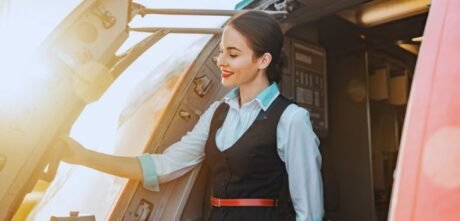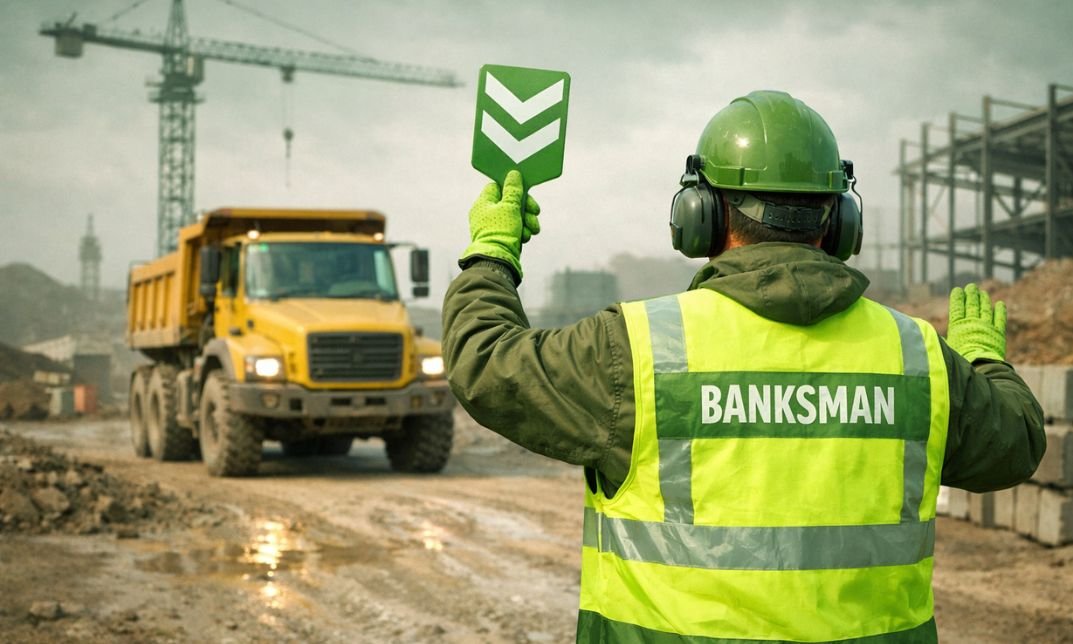No products in the cart.
Thinking of becoming a flight attendant? You’re probably wondering, “What qualifications do you need to be a flight attendant in the UK?” Simply put, it’s about meeting legal requirements, passing medical and safety checks, and showing top-notch customer service skills. This guide breaks it all down—step by step—so you can take off on your cabin crew career with confidence.
Quick Answer — What Qualifications Do You Need To Be A Flight Attendant in the UK?
So, what does the law actually say you need to become a flight attendant in the UK? Here’s the short version:
- Age: You must be 18 or older to get a Cabin Crew Attestation (CCA).
- Training: Complete approved safety training to earn your CCA—this is your licence to work as crew.
- Health check: Pass a cabin crew medical, renewed every 5 years or less. If it expires, you can’t fly.
- Security check: Pass airside ID checks (BPSS vetting). This includes ID, right to work, 5-year job history, and a basic criminal record check. The pass lasts up to 5 years.
- Passport & English: Airlines require a valid passport and good English skills.
What UK Airlines Really Look For

Every UK airline has its own rules for cabin crew. Here’s a quick, clear snapshot of what they expect:
British Airways (BA)
- Age: 18+
- Certification: Valid Cabin Crew Attestation (CCA)
- Reach/Height: Functional reach 2.01 m (~1.575 m tall) for doors, slides, and overhead bins
- Tattoos: No visible tattoos in uniform
- Medical: Valid UK cabin crew medical
- Security: Pass airside ID checks
- Extras: Complete standard onboarding; strong teamwork, communication, and customer service skills
Virgin Atlantic
- Age: 18+
- Reach/Height: Arm reach ~210 cm (tiptoes allowed)
- Right to Work: Must live/work legally in the UK
- Tattoos: Virgin Atlantic tattoo policy allows visible tattoos if appropriate and uniform-friendly
- Medical: Valid UK cabin crew medical
- Security: Pass airside checks
- Extras: Excellent communication and customer service skills
Careers page
easyJet UK
- Age: Typically 18+
- Height: 157.5–190 cm
- Swimming: Must swim 25 m unaided, tread water, inflate life jacket, and climb into a survival raft
- Medical: Valid UK CAA medical
- Living Distance: Within 90 minutes of base
- Extras: Strong customer service and friendly, professional attitude
Careers page
TUI Airways UK
- Age: 18+
- Reach/Height: 188 cm (6’2”)
- Swimming: 25 m unaided
- Medical: Valid cabin crew medical
- Security: Pass airside checks
- Living Distance: Within 90 minutes of base
- Extras: Teamwork, friendliness, excellent customer service
Jet2.com
- Standards: Follow UK cabin crew rules
- Living Distance: Within 75 minutes of base
- Security: Pass airside ID checks, 5-year references, and criminal record checks
- Extras: Strong customer service, problem-solving, and communication skills
- Height/Swim: Not strictly published, but standard UK cabin crew norms apply
Careers page
Ryanair UK
- Height: 157–188 cm
- Swimming: 25 m unaided
- Skills: Strong English and flexible with shift rosters
- Certification: Valid cabin crew attestation and UK cabin crew medical
- Extras: Professionalism, teamwork, excellent communication.
Wizz Air UK
- Age: 18+
- Reach: Arm reach 210 cm (tiptoes allowed)
- Swimming: Required
- Right to Work: Must live/work legally in the UK
- Tattoos: No visible tattoos in uniform
- Living Distance: Within 90 minutes of base
- Medical & Security: Valid UK cabin crew medical and pass airside checks
- Extras: Teamwork, friendly attitude, strong customer service skills
Exactly What the Law and Regulators Expect
We have already answered “What Qualifications Do You Need To Be A Flight Attendant in the UK?”. But if you want to work as a flight attendant in the UK, there are a few laws you have to follow. Don’t worry—they’re not as scary as they sound. Let’s break them down:
1. Cabin Crew Attestation (CCA)
This is basically your licence to fly. Without it, you can’t legally work as cabin crew. To get it, you need to complete official safety training approved by the Civil Aviation Authority. You’ll learn how to handle emergencies, use safety equipment, do evacuation drills, and manage passengers. Think of it as your golden ticket—you’ll need this in your pocket before stepping onto real flights as crew.
2. Medical Fitness
Airlines need to know you’re fit enough to handle the job. That means getting a medical check. They’ll test your eyesight, hearing, heart health, and overall stamina. Depending on your age and airline, your medical can last up to five years. The smart move? Renew it a little early—about 45 days before it expires—so you don’t risk being grounded.
3. Security and Background Checks
Since you’ll be working in restricted areas at the airport, you need to pass security checks. Airlines will check your ID, nationality, right to work in the UK, and your last five years of work or address history. They’ll also look at any criminal records. If you pass, you’ll get an airside ID that’s valid for five years, which lets you access the secure parts of the airport.
Physical Standards Explained
Physical Standards You’ll Need to Meet
Before you can work as a flight attendant in the UK, airlines will check a few physical standards. These aren’t about looking a certain way—they’re all about safety and making sure you can handle the job. Here’s what you need to know:
Reach, not height
A lot of people worry about being “too short” for the job, but airlines don’t actually measure height—they check your reach. That means how high you can stretch your arm. British Airways wants you to reach 2.01m, while Virgin Atlantic asks for around 210cm. This isn’t about looking tall—it’s so you can easily open cabin doors, pull down emergency slides, and reach overhead lockers. If you’re worried, try stretching at home or in the gym—you might reach further than you think.
Swimming ability
Yes, you need to know how to swim. Most airlines require you to swim at least 25 metres without any help, plus stay afloat for a short time. Why? Because in the rare chance of a water landing, passengers will look to you for guidance. If you’re not a confident swimmer, don’t panic—you can take lessons before applying. Many candidates do this, and it shows the airline you’re serious about the job.
Tattoos
Tattoo rules can trip people up. Airlines don’t mind tattoos, but they do care if they’re visible in uniform. British Airways, for example, doesn’t allow tattoos that can be seen on your arms, legs, neck, or face while you’re working. Virgin Atlantic is more relaxed—you can have tattoos that show, as long as they’re tasteful and don’t clash with the uniform. If your tattoos are in visible spots, check your chosen airline’s policy before applying.
Other checks you might face
Some airlines might also check things like piercings, hair colour, and overall grooming. It doesn’t mean you can’t express yourself—it just means you’ll need to keep a professional look while on duty. After all, passengers see you as the face of the airline.
Step-by-Step — How to Qualify in the UK
Follow these steps to qualify as a UK cabin crew member. From pre-checks to training, this guide shows exactly what you need to start flying.
- Pre-check: Be 18+, hold a passport, speak English, and be ready for reach/swim tests.
- Apply: Pick an airline, complete online tests, then shine at the assessment day.
- Security Vetting: Gather 5-year history docs, ID, and clear your criminal record check.
- Medical: Book your cabin crew medical before training. Keep track of expiry rules.
- Training: Finish approved training, earn your CCA, and you’re ready to fly!
FAQs
What GCSEs do flight attendants need?
- Typically, five GCSEs (A*–D), including English and Maths.
What is the salary of a flight attendant in the UK?
- Average salary ranges from £18,000–£30,000, with experienced crew earning more.
What qualifications do you need to be a flight attendant?
- GCSEs, cabin crew training (CCA), UK cabin crew medical, and airside ID checks.
Can Virgin cabin crew have tattoos?
- Yes, visible tattoos are allowed if appropriate and uniform-friendly.
How much do Virgin cabin crew get paid?
- Starting salary is around £21,000–£23,000, plus allowances and benefits.
Can flight attendants have leg tattoos?
- Depends on the airline. BA forbids visible tattoos, while others, like Virgin, allow them if discreet.
Ready to take off on your cabin crew career?
Then join Wise Campus and enrol in our Diploma in Air Cabin Crew Course today. Here, you’ll get step-by-step GCSE guidance, complete CCA preparation, medical readiness, and airside skills to set you up for success.
So, don’t wait—start your journey to the skies with Wise Campus and become the confident, professional flight attendant airlines are looking for!





